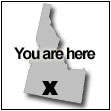
7. Kurt Elling - The Messenger
In the Coltrane post, I made mention of my penchant for vocal jazz. Soon after my discovery of Blue Train, I began listening to Mark Murphy and Chet Baker in earnest and trying desperately to improve my vocal chops. I could hardly have chosen two more disparate vocalists had I searched all of Jazzdom. For a while, I thought I was getting somewhere. I took Mark Murphy's unconventional and unabashedly daring arrangements and improvisations to heart, pushing myself to the edge of my comfort zone. I attempted to fill my voice with melancholy and dreams lost in booze and smoky haze like Chet Baker. All of this was moderately successful for me. Then, when I was a senior in college and at the very top of my game, I heard Kurt Elling.
A lot of people have recorded "Nature Boy," just go to AMG and take a look. But do yourself a favor and check out Elling's version. The important thing here is that Elling pays homage to the definitive version of the tune (Nat King Cole's) in his intro, and then lets his rhythm section cook over the changes and transform it into something fresh. What really blew me away was the scat solo in the improv section. The first time I listened to The Messenger, I was in my car driving home; I had to pull over and just sit and listen. I was blessed with the opportunity to see the Kurt Elling Quartet in Seattle a few years back. His version of "Tanya Jean" with the vocalise of Dexter Gordon's sax solo, my favorite, was absolutely mesmerizing. Hero worship aside, I think what struck me most about Elling on The Messenger was his connection to the rhythm section. He bridges the gap that often exists between singers and instrumentalists, providing room for everyone to shine. Moreover, he proves that you can be progressive as a jazz vocalist and still be respectful of the idiom. And for me, Elling's mastery of the style and ingenuity in interpretation showed me that I was on the right track, but not nearly passionate enough.
In the Coltrane post, I made mention of my penchant for vocal jazz. Soon after my discovery of Blue Train, I began listening to Mark Murphy and Chet Baker in earnest and trying desperately to improve my vocal chops. I could hardly have chosen two more disparate vocalists had I searched all of Jazzdom. For a while, I thought I was getting somewhere. I took Mark Murphy's unconventional and unabashedly daring arrangements and improvisations to heart, pushing myself to the edge of my comfort zone. I attempted to fill my voice with melancholy and dreams lost in booze and smoky haze like Chet Baker. All of this was moderately successful for me. Then, when I was a senior in college and at the very top of my game, I heard Kurt Elling.
A lot of people have recorded "Nature Boy," just go to AMG and take a look. But do yourself a favor and check out Elling's version. The important thing here is that Elling pays homage to the definitive version of the tune (Nat King Cole's) in his intro, and then lets his rhythm section cook over the changes and transform it into something fresh. What really blew me away was the scat solo in the improv section. The first time I listened to The Messenger, I was in my car driving home; I had to pull over and just sit and listen. I was blessed with the opportunity to see the Kurt Elling Quartet in Seattle a few years back. His version of "Tanya Jean" with the vocalise of Dexter Gordon's sax solo, my favorite, was absolutely mesmerizing. Hero worship aside, I think what struck me most about Elling on The Messenger was his connection to the rhythm section. He bridges the gap that often exists between singers and instrumentalists, providing room for everyone to shine. Moreover, he proves that you can be progressive as a jazz vocalist and still be respectful of the idiom. And for me, Elling's mastery of the style and ingenuity in interpretation showed me that I was on the right track, but not nearly passionate enough.


